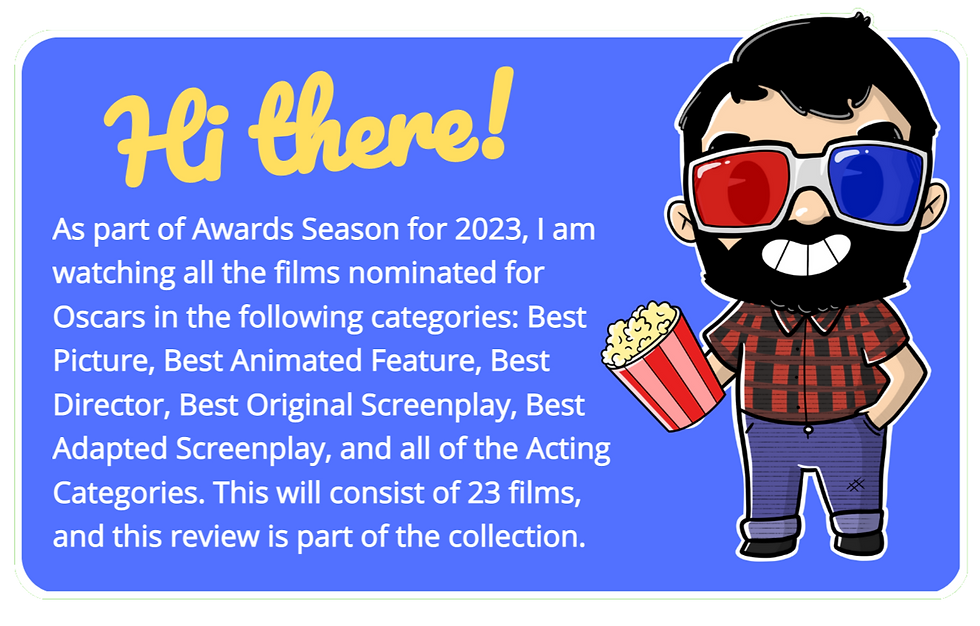Pinocchio: The Little Wooden Boy Who is DEFINITELY NOT a Fascist
- Frank Schierloh
- Jan 30, 2023
- 4 min read
Updated: Feb 8, 2023

The first movie I'm watching as part of the Awards season this year is Guillermo del Toro’s Pinocchio.
Full disclosure, I was not a Pinocchio child. Yes, I had seen the Disney version as a child (not the remake that also came out this year), but it never really stuck with me. Maybe because it was terrifying? Or perhaps I just wasn’t Italian enough? Who’s to say?
Questions of my Italian heritage aside, Guillermo del Toro has spent years crafting this new take on a familiar tale, and to his credit, he puts his stamp all over this film, making the story of Pinocchio (which is already quite dark) extremely bleak. He follows the paths of previous adaptations, and links together several of the original short stories; weaving them into a narrative structure that highlights his animation.
Visuals, Papa:
Visually, this movie is stunning, with exceptional character design, innovative animation techniques, and that "del Toro flair" you expect if you’re familiar with his previous work. Pinocchio himself is instantly adorable and unlike any version of the character you’ve seen before. Gepetto is haggard and rough around the edges: a man who has lived a full life. The Wood Sprite and Death are both feasts of the imagination for two beings that transcend the mortal realm.
The animation as a whole is absolutely remarkable, with sequences that make you question just how they did it all. Stop-motion can occasionally look a little clunky, but this was one of the smoothest animations I've seen. I grew up always enjoying and being impressed by the art of stop-motion animation, and this film is no different; a labor of love and you can tell that in every shot.

It's a metaphor?!:
As visually stunning as this film is, I must admit to feeling a sense of disconnect. There was something about the metaphors that were layered onto the story that just didn't quite work for me. The film takes place during the height of fascist Italy in World War II, and uses that background to explore some darker themes. We follow Pinocchio on a journey through fascist Italy, watching him perform in pro-fascist numbers that don't so much as explore the ideas of fascism and how it negatively affects humanity but rather water it down to “fascism = bad”.
However, we don't really get a moment of Pinocchio realizing what he's promoting is wrong, he just decides to get personal revenge and sings a song disparaging Mussolini. I think that was another aspect of his characterization that felt off; Pinocchio never learned anything. He just behaved reactionary for the whole film, which made any type of moral narrative feel flimsy. There are few moments of levity to cut through the tension and the onslaught of terrible things happening. I felt like I couldn't catch my breath from Pinocchio's journey to process what was happening to him.
Music and voices:
There are songs interspersed throughout the first half of the movie. Which, don't get me wrong, I love a musical moment, felt so completely out of place from the narrative that we were following. I was also confused as to how songs worked within this universe. A great musical can clearly define whether the songs are diegetic or non-diegetic, and the beginning of this movie doesn't. The songs are all insular, except for the few that Pinocchio sings as a performance. I will say that "Ciao, Papa" is a lovely composition of a song and it was a shame that it was left out of the Best Song race at this year's Academy Awards.
The voice cast gave strong performances overall, with a special shout out needing to go to Gregory Mann as Pinocchio. He really carried the film on his shoulders and made Pinocchio a wonderful balance of youthful joy and optimism, with the petulance of a child who doesn’t know what they’re doing. He is supported by a cast of adult actors who all bring their best. Voice acting is a different beast than onscreen, and these performers show their depth of range in both. One thing I do wish they had worked on more was the accents within the film. I wish there was a touch more consistency, as some had British, some had American and some had Italian accents, when they were all from the same small town in Italy.
A funny side story from while I was watching this: I knew that both Cate Blanchett and Tilda Swinton were in this film (I am gay) and was very excited to hear their work. I had assumed one would be the Wood Sprite and the other Death, but was surprised to learn midway through that both of those characters were voiced by Tilda Swinton, and Blanchett voiced Spazzatura, the carnival monkey/ antagonist. I hadn’t been this delighted by a famous actor portraying a mostly wordless animal since Alan Tudyk voiced Hei-hei in Moana.

Final Thoughts:
Overall, this movie is a visually stunning piece that left me feeling a little hollow. While I think there is much to appreciate here, it left me feeling like it was too adult for a kids movie, but too immature for an adult movie. Maybe there is more to mine from it in repeat viewings, but I’m not sure it left enough of an impression on me to revisit it immediately. I can definitely understand why it is getting a lot of recognition for the sheer amount of excellent animation work that went into it, I just wish the story and metaphor were a bit more examined and prioritized. I would definitely recommend it for the visuals alone, and encourage you to watch del Toro's other work that, in my opinion, has more nuanced use of metaphor.




Comments